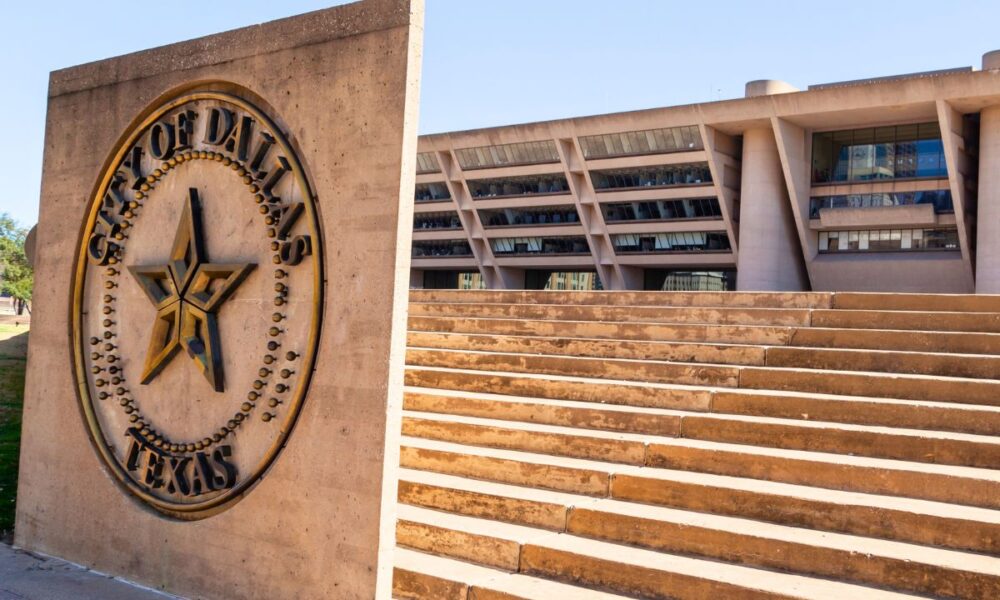The Dallas City Council told staff to begin considering the future of City Hall.
The council passed a resolution 12-3 on the evening of November 12, directing City Manager Kim Tolbert to assess potential future sites for City Hall. This follows concerns about the aging building’s condition and the development prospects for its current downtown site.
“Today’s vote is not about the city moving from City Hall. It’s not about the city staying at City Hall,” said Councilman Chad West in the meeting. Rather, he said, the vote was to follow through on Mayor Eric Johnson’s previous directive to the Finance Committee.
Johnson had asked the committee to determine if City Hall and other facilities “effectively support city operations and best serve the citizens of Dallas, consider all potential options, and identify the most fiscally responsible course to address the mounting deferred maintenance and carrying costs of Dallas City Hall,” according to West.
Members of the Finance Committee and others have been discussing this for several weeks, West added.
“The one thing that is clear is that we need to better understand the options and the costs to make an informed decision,” West said. “We owe it to our taxpayers to do so.”
In the basement of Dallas’ former City Hall, Jack Ruby shot and killed Lee Harvey Oswald – the alleged assassin of former President John F. Kennedy – in 1963. Moving on from the tragedy, the city built its current City Hall, which opened in 1978. The iconic building sits just south of downtown.
After nearly 47 years, the building is showing signs of its age.
“The elevators, they probably need to all go and be replaced, because they are very old – and that’s normal for a building,” said Councilwoman Cara Mendelsohn. “I have also been stuck in them, lots of firefighters pulling me out, and I appreciate that.”
Mendelsohn called to address the elevators and identified issues with the building’s roof, plumbing, and parking garage. Otherwise, she pointed to the concrete building’s durability.
“I challenge you on your way out – do you see anything that gives you pause that you’re not in an extremely durable building?” she said.
Mendelsohn called to address the process step by step, which is why she supported Councilman Paul Ridley’s unsuccessful motion to launch an initial assessment of City Hall’s status.
“The speed of this process is something I’ve never seen, whether I was serving on a board or commission or as a council member,” she said. “I think what that’s done is, it has raised a lot of suspicion with the public, I think it has raised suspicion with council members.”
When the council directed Tolbert to begin evaluating other options, the resolution emphasized the need for efficiency on behalf of taxpayers.
“The City of Dallas, to perform its governmental functions, seeks to ensure efficient and cost-effective use of City facilities to best serve residents and employees,” the resolution reads.
The Finance Committee was briefed on the state of City Hall on November 4 and then asked staff to consider relocating city operations to other facilities, as stated in the resolution. It stated that further evaluation of real estate and economic development opportunities was necessary to inform decisions about the future of City Hall.
The resolution instructed Tolbert to “evaluate real estate opportunities” and report her findings to the Finance Committee by February 2026.
The evaluation must include office space needs for departments in City Hall and other facilities, office space available for lease and purchase citywide, and proposed sites for potential “creation” of new government offices. It must also compare costs, use “external expertise” to review deferred maintenance costs, and consider alternate siting for “non-traditional office” functions.
Furthermore, the resolution also directed Tolbert to consider “economic development options” for redeveloping City Hall, supporting the Kay Bailey Hutchinson Convention Center, increasing tax revenue, and promoting “catalytic growth” in the central business district. It also estimated the value of City Hall’s current site.
Evan Sheets, vice president of planning and policy for Downtown Dallas Inc., called for a thorough assessment of City Hall’s current needs and how future plans would impact the surrounding area.
“We believe that expanding that exploration to include adjacent public and private property is sensible and appropriate,” Sheets said. “DDI remains committed to participation in this dialogue. We offer our support, and on behalf of our CEO, we request engagement in this effort to ensure an outcome reflective of the established vision for the core of our city.”
If officials eventually demolish City Hall, rumors have been circulating that the Dallas Mavericks are considering the site for an arena, as previously reported by The Dallas Express. In an earlier hearing, residents took aim at the Mavericks and emphasized City Hall’s historic role in the community.
“Preservation is important to me,” said Mayor Pro Tem Jesse Moreno. “Please know that I would not be voting on anything without doing my due diligence and asking the right questions and those tough questions, and that includes having all the options in front of us, understanding the true cost, the data, and – very importantly – the economic development impact.”


